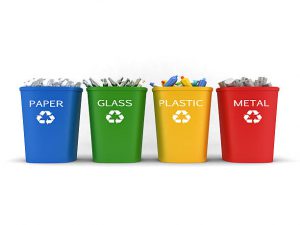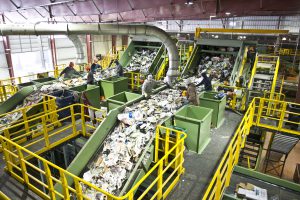Recycling can be so confusing! Can you recycle juice boxes? Egg crates?, Coffee cups? Oh My! The answer likely depends on where you live. For example, tin foil? Sometimes, but it better not have food stuck to it? Plastic bottles? Most of them, but what about the tops? Pizza boxes? Yes, but not if they’re greasy? What pizza box isn’t greasy?
We’re trying to do the right thing for the planet, but sometimes when it comes to recycling, we just don’t know what that is. The confusion makes some of us just give up and not even bother to recycle. For others, we just toss “questionable” items in the recycling bin and hope for the best. This hopeful recycling or what has been coined “wishcycling” can have disastrous results. Non-recyclable items mixed in with recyclables can contaminate the whole bin and cause a week or month’s worth of recycling to wind up in a landfill anyway!
For recycling to work, there are many pieces that have to come together. Local governments need to initiate a recycling program, provide collection bins and procedures, build transportation infrastructure and work with capable recycling facilities. If there is a breakdown anywhere along the chain, recycling just won’t happen.
No National Standards
There are no national standard for recycling. Every town and city makes its own rules. Different local governments and waste management services make decisions based on things like demand for certain recycled materials, transportation capabilities and recycling technology. To make matters worse, any of these factors can change at any time.
Recycling Plants Are Run by Machines Not Magicians
Recycling plants throughout the country (and the world) have different equipment for  sorting and recycling waste. These machines are constantly changing as technology moves forward. Understanding the limitations of recycling plants and their sorting machines helps to explain certain recycling restrictions.
sorting and recycling waste. These machines are constantly changing as technology moves forward. Understanding the limitations of recycling plants and their sorting machines helps to explain certain recycling restrictions.
For example, in some areas, recycling that is tied up in plastic bags instead of being left loose in a bin, won’t get recycled. That is because some recycling plants rely on machines, not human sorters. There is no way for these machines to open bags and place items on conveyer belts. The full bags have to get hauled off to a landfill instead. Yikes! Also, some things can jam the machines. Plastic grocery bags, plastic and metal tops to bottles, shredded paper, different types of glass, small prescription bottles. The list goes on.
Rubbish or Recycle? Ask Locally
We all know what to do with aluminum cans and newspaper. That’s easy. But with so many different kinds of materials and colors and mixed materials, most of our recycling decisions are not as clear. The plastic bag inside a cereal box? Chinese food cartons with metal handles? batteries? styrofoam containers? When in doubt, don’t just throw it out! Call your local waste management provider and ask them what to do.
Conclusion
Of course, putting the responsibility on individuals to clear up all of this recycling confusion is asking a lot. National standards on the recycling of paper, metal, plastic, glass, etc. would help increase recycling rates and quality, and help ensure that what gets into the recycling stream actually comes out recycled.
What do you think? Are there items you might be putting in your recycling bin that your local facility can’t process? Are there ways you think recycling can be simplified? Please share your comments, questions and suggestions below…